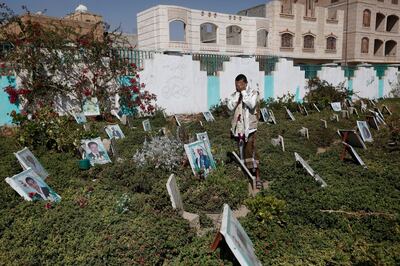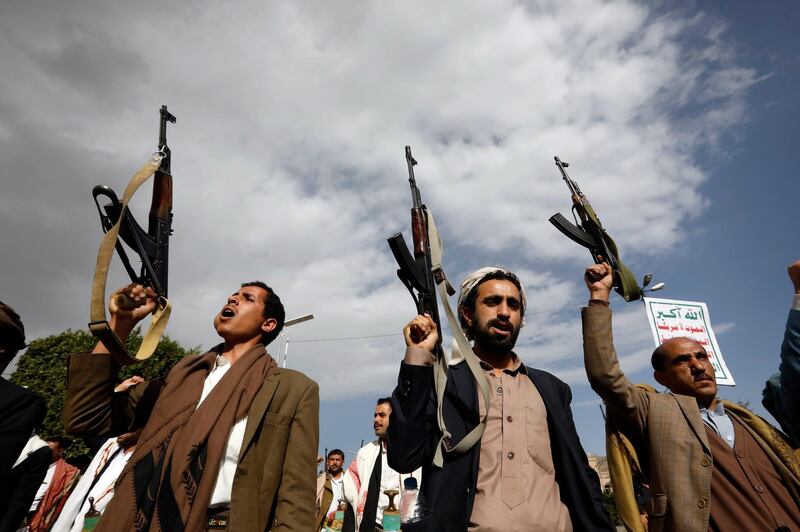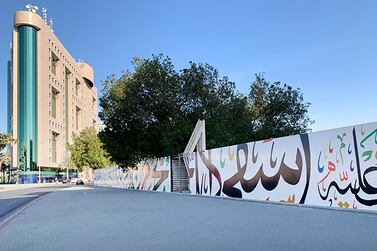If US President Joe Biden is really serious about bringing Yemen’s appalling civil war to an end, then his administration needs to act more robustly than the measures it has taken so far in terms of curbing the malign involvement of Iranian-backed Houthi rebels in the conflict.
Having initiated the fighting back in 2014, when Houthi rebels overthrew the internationally recognised government of Abdrabbu Mansour Hadi, the Houthis and their Iranian backers have been primarily responsible for prolonging the conflict by consistently frustrating UN-sponsored efforts to negotiate a lasting ceasefire. The Houthis also bear much of the responsibility for the dreadful humanitarian crisis the country now faces because the Houthis control most of the main aid supplies into the country, and have, in effect, been able to hold Yemen’s starving civilian population to ransom over aid distribution.
Another area where the Houthis have contributed significantly to prolonging the conflict is by extending the fighting beyond Yemen’s borders, with Houthi forces regularly using Iranian-made weapons to attack civilian targets in neighbouring Saudi Arabia.
It was this latter action by the Houthis that persuaded Mr Biden’s predecessor, Donald Trump, to designate the Houthi rebels a terrorist organisation in the final days of his presidency.
The terrorist designation was applied to the Houthis in an attempt to draw international attention to the rebels’ culpability, and to curb their ability to acquire arms and support from abroad.
Announcing the decision in January to designate the Houthi movement, known formally as Ansar Allah, as a Foreign Terrorist Organisation, Mr Trump’s secretary of state, Mike Pompeo, said the aim of the move was “to hold Ansar Allah accountable for its terrorist acts, including cross-border attacks threatening civilian populations, infrastructure, and commercial shipping".
The US action banned Americans from doing business with the Houthis and made it a crime to provide support or resources to the movement. But the move provoked widespread condemnation from international aid organisations and humanitarian groups, which argued that the designation would limit their ability to distribute aid in Houthi-controlled areas of the country. Those complaints were by implication a clear admission of the stranglehold the Houthis continue to maintain over Yemen’s aid supplies.
It was in response to the international outcry that Antony Blinken, in one of his first acts as Mr Biden’s secretary of state, announced his decision to revoke the designation. Speaking shortly after his appointment, Mr Blinken said the designation needed to be lifted because of humanitarian concerns.
“It’s vitally important, even in the midst of this crisis, that we do everything we can to get humanitarian assistance to the people of Yemen, who are in desperate need,” he said.
The decision to lift the terrorist designation against the Houthis came at the same time that the Biden administration announced it was ending military support for offensive operations by the Saudi-led coalition in the Yemen conflict. Mr Biden has also named a veteran diplomat, Tim Lenderking, as America’s special envoy for the conflict, promising to double down on diplomacy to end the war.

Now, in a belated attempt to demonstrate that the Biden administration remains serious about holding the Houthis to account for their role in prolonging the Yemen conflict, Washington this week announced that it was imposing sanctions against two leading Houthi commanders.
The State Department said the measures were being imposed against Mansur Al Saadi, the Houthi Naval Forces Chief of Staff, and Ahmad Ali Ahsan Al Hamzi, the commander of Yemen’s Houthi-aligned Yemeni Air Force and Air Defense Forces, citing their alleged roles in cross-border attacks on Saudi Arabia and shipping vessels in the Red Sea.
The US action predictably prompted further criticism from aid organisations, which claimed – yet again – that the measures would prolong the war and worsen the humanitarian crisis.
And yet, the limited nature of the US action against the Houthis raises questions about the commitment of the Biden administration to holding the rebels to account. The overall weakness of Washington’s response is likely to send a message to both the Houthis and their Iranian backers that the US is not so interested in their illegal takeover of Yemen as it is being seen to be concerned for the country’s humanitarian crisis.
With an estimated 16 million people facing starvation in what has been called the world’s worst humanitarian disaster, ending the suffering of the Yemeni people is, without doubt, a key priority. But it is highly unlikely that this goal can be achieved while the Houthis remain in control of large swathes of the country and allow criminal gangs to control the aid supplies.
Certainly, one of the reasons there has been such a disastrous decline in foreign aid to Yemen in recent months is that governments have come to the conclusion that there is little point making much-needed donations to the Yemen relief effort if all that happens is that the aid is then used to line the pockets of the Houthi gangs that maintain control over most of the major aid supply routes.
Furthermore, the extremely modest measures now being taken by Washington in the form of sanctions being implemented against only two commanders will hardly encourage the rebels to change their behaviour. Washington might insist that imposing sanctions against senior Houthi operatives will limit their ability to wage war, but the reality is that they will still have the manoeuvring room to deepen their ties with Iran.
So if the Biden administration is really serious about ending Yemen’s humanitarian disaster, it needs to adopt far more robust measures against the Houthis.
Con Coughlin is a defence and foreign affairs columnist for The National






